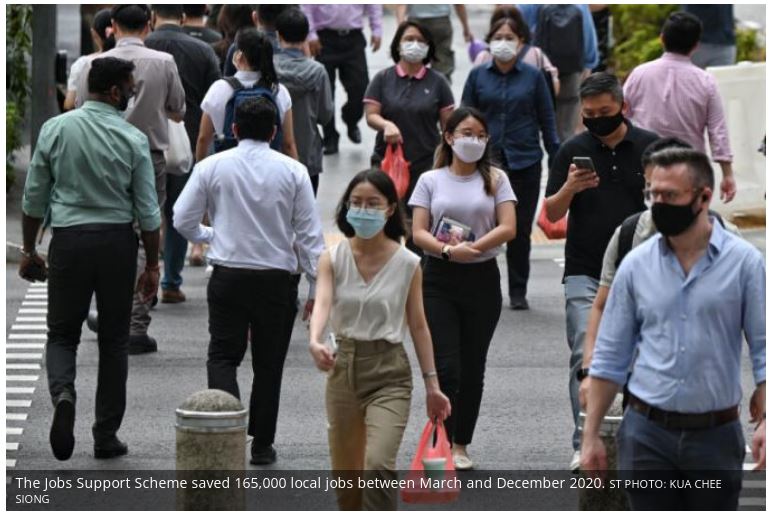Covid-19 measures saved Singapore’s resident unemployment from reaching 7.5% in 2021
COVID-19 support measures boosted gross domestic product (GDP) in 2021 by 0.8 percentage points and kept resident unemployment 4 percentage points lower than it would have been otherwise in the same year, a paper by the Ministry of Finance (MOF) has found.
Singapore’s economy in 2021 grew 7.6 per cent year on year, while annual resident unemployment stood at 3.5 per cent.
Similarly, the measures supported Singapore’s real GDP growth in 2020 by 6.6 percentage points and kept resident unemployment 2 percentage points lower than it would have been.
About 8,000 Covid-19 deaths were avoided between Aug 1 and Dec 31 last year due to Singapore’s public health measures and vaccination drive.
At 15.7 Covid-19 deaths per 100,000, Singapore has one of the lowest Covid-19 mortality rates in the world, said MOF.
The paper also laid out the impact of specific Covid-19 schemes for businesses and workers.
The Jobs Support Scheme (JSS) – which provided wage subsidies to employers to help them retain workers – saved 165,000 local jobs between March and December 2020. The study did not provide estimates for its further impact in 2021.
“There is evidence that local wages also improved by between 1.7 per cent and 5.3 per cent for every 10 percentage points increase in the effective JSS wage subsidy,” said MOF.
The 3 loan assistance programmes for small and medium-sized enterprises supported more than 27,000 enterprises in accessing loans of more than S$24.7 billion between March 2020 and December 2021.
These schemes include the Temporary Bridging Loan Programme (TBLP), Enterprise Financing Scheme – Working Capital Loan, and Enhanced Enterprise Financing Scheme – Trade Loan.
Of the firms supported, around 9 in 10 were micro and small enterprises, said MOF. The amount of loans provided was significantly higher than in 2019, where S$1.3 billion in loans were accessed.
As of the end of October last year, more than 166,300 jobs and skills opportunities were filled under the SGUnited Jobs and Skills Package (SGUJS), with 122,300, or over 70 per cent, being job placements.
MOF said the placements comprised “a good mix” of professional, managerial, executive and technical (PMET) and non-PMET roles, with more than 7 in 10 job roles being long-term.
A majority of the trainees enrolled under the various SGUJS schemes also found employment within 6 months after the programme.
The Jobs Growth Incentive (JGI) – which supported employers to expand their local workforce – supported the additional hiring of 47,000 more local workers between September 2020 and February 2021. About 27,300 more mature workers were also hired due to JGI during this period.
MOF said close to half of those employed through JGI were previously unemployed or outside of the labour force, with close to 30 per cent unemployed for more than 6 months.
Finally, as of December last year, the Covid-19 Recovery Grant supported 27,500 employees and self-employed persons who were financially impacted by the pandemic.
Separately, the paper also looked at how the Covid-19 support measures mitigated the longer-term impact the pandemic would have had on the economy.
Compared to other advanced economies, Singapore was able to reduce the loss to potential output, experienced limited increases in corporate debt and continued to raise resident employment through its support measures.
Other mitigating effects include maintaining the job prospects available to recent graduates and preventing widened income inequality among the population.
Source: https://www.businesstimes.com.sg/government-economy/covid-19-measures-saved-singapores-resident-unemployment-from-reaching-75-in-2021


 English
English




